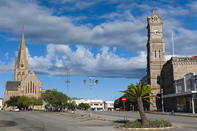Fellow of an Oxford College
In 1886 the boys of Dale College travelled by oxwagon from King William's Town to play rugby against St Andrew's. In the same year an Old Andrean, HA White, son of Reverend HM White, chairman of the school council and first headmaster of Bishops, achieved two firsts at New College, Oxford, and went on to obtain a first in Theology and to become the first South African to be elected a Fellow of an Oxford college.

Young Willem Jan Klerck immediately ran away to join his father with the Boers in the field during the South African war, but was caught at Alicedale and dragged unwillingly back to school. He went on to become head boy and upon leaving school took up a military career, serving with distinction in both world wars and eventually becoming Officer, commanding the Orange Free State Command. His son and grandson followed him to St Andrew's. A schoolmate of Klerck's, Charles Holder, meanwhile, on vacation in Johannesburg, was conscripted and assigned to a Boer commando.
Clock Tower War Memorial
Charles Holder was taken prisoner at Elandslaagte by British forces that included Old Boys of St Andrew's; one of them was Charles Herbert Mullins, second son of Canon Robert Mullins. A Captain in the Imperial Light Home, he was awarded the Victoria Cross at Elandslaagte; he was later badly wounded but survived to build up a distinguished legal career and become President of the High Court of Swaziland and Basutoland.
In public office and on active service in the ensuing periods of war that ended in 1945, descendants of Canon Mullins were to be awarded the title ‘The Companion of St Michael and St George "CMG", two Distinguished Service Orders, two Military Crosses, two Distinguished Flying Crosses and an Order of the British Empire’.
Many Old Andreans served in the British Army, the Navy and the Royal Flying Corps, the forerunner of the Royal Air Force. Among them was Lieutenant-Colonel John Sherwood Kelly, CMG, DSO, officer commanding the fifth battalion Inniskilling Fusiliers, who was awarded the Victoria Cross in the battle of Marcoing, France, in November 1917. The names of the fallen Old Andreans were inscribed in the roll of honour on the Clock Tower War Memorial, built in 1923; following the Second World War another 131 names were added.
By David Bristow